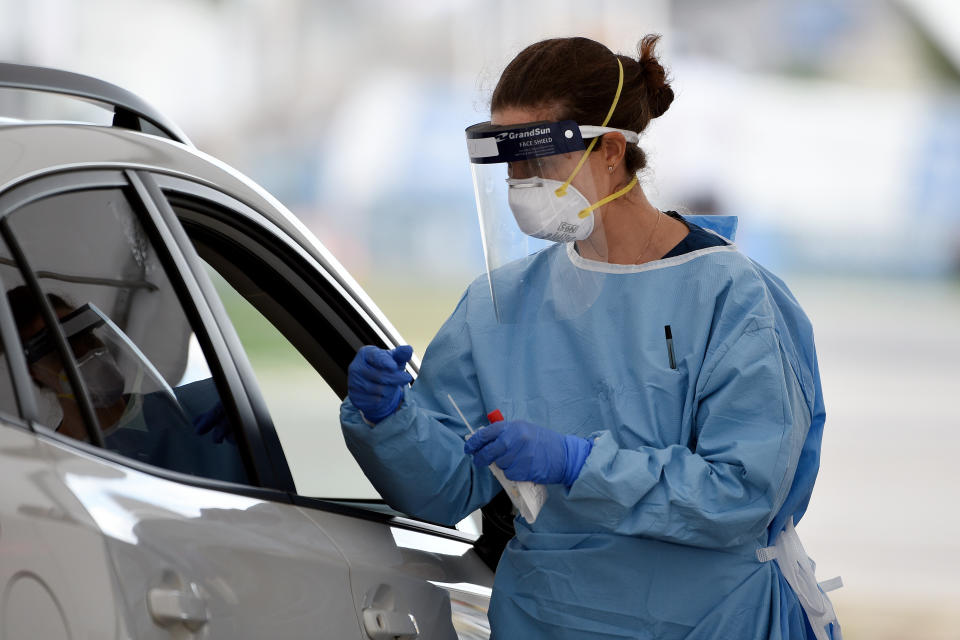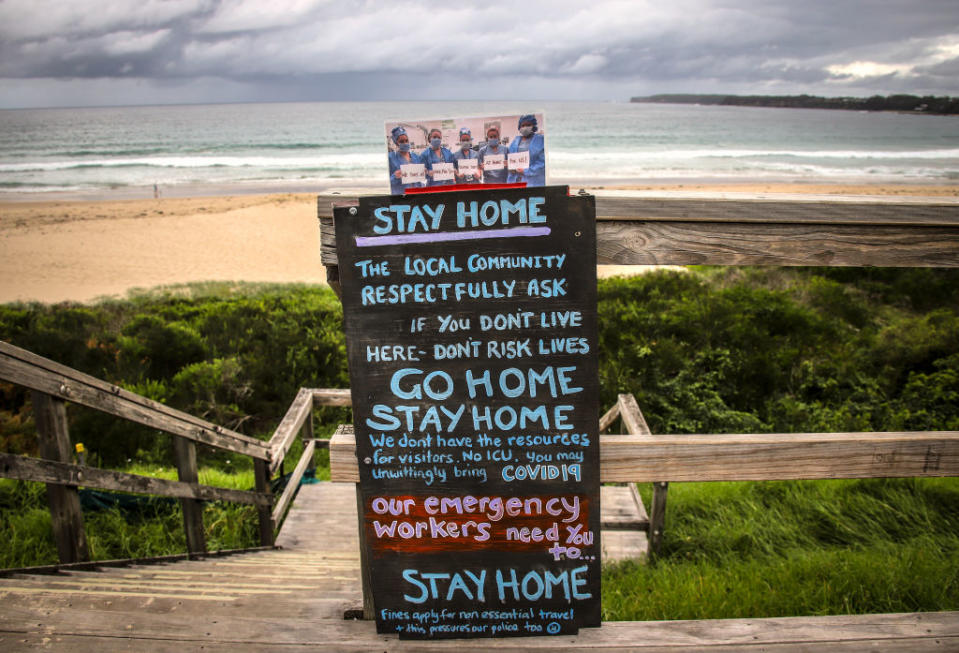What are immunity passports – and could they mean the end of lockdown?
As Australians long to return to normalcy and governments around the world become increasingly desperate to restore economic activity amid to the coronavirus pandemic, a controversial idea is quietly gaining support.
The concept of an immunity passport, or an immunity certificate, is being held up as a possible pathway out of lockdown for societies hit hard by COVID-19.
In theory, the passports would be given to those who have already had COVID-19 and are no longer shedding the virus and have antibodies in their bloodstream which indicate an immunity to the virus.
Coronavirus live blog: Latest news and updates from Australia
Politicians in countries including the UK and Italy are grasping at the idea as a possible short-term panacea to the economic pain of bringing society to a grinding halt.
The concept has some strong backers in Australia too, including Professor Peter Doherty who won the 1996 Nobel prize in physiology or medicine for his research on immunity and how humans fight viruses.
“Somehow or another we got to get out of this situation,” Prof Doherty told Yahoo News Australia.

“A lot of people have had the infection and they don’t know it. So we need to be able to tell them … and send them back to work.”
Unlike countries such as the UK, the US and Italy where the idea is being strongly considered, Australia doesn’t yet have the infection rate to make immunity passports a major consideration of policy makers.
“In a way we have almost been too successful because the level of community transmission looks really low, so we’re not getting a lot of people immune basically,” Prof Doherty said.
“I think the strategy here has always been to protect old people and those with comorbidities, but have a reasonable level of infection that would gradually build up immunity.”
Early research indicates the likelihood of becoming reinfected with COVID-19 is very low.
“I think that it’s very unlikely that you won’t be protected” once you’ve already had COVID-19, Prof Doherty said.
“I personally doubt people can get reinfected ... If you did, it would be very mild because you’ve got the immunity primed up, even if the virus changed.”
However any system of immunity passports, he warned, would need to be rolled out in a way that continues to protect the elderly and vulnerable.
Pin prick test ‘will become available’
As part of his work with the University of Melbourne and the Royal Melbourne Hospital, Prof Doherty works with a lab that examines and validates medical testing equipment, and he believes a simple and cheap screening test will be developed to carry out widespread antibody testing.
“What we’re talking about is a test that you could screen large numbers of people… that would be a pin prick of blood,” he said. “That sort of test is quite possible, it will be available.”
It would be the first time the world has sought to conduct such widespread antibody testing.
“The Brits have talked about it a lot but they still don’t have a suitable screening process,” he said.

While the Australian government is reportedly not currently pursuing the idea, health authorities haven’t ruled anything out. Like most aspects of the pandemic, Australia has the advantage of watching other countries where the virus has spread through the population at much greater levels.
UK Health Secretary Matt Hancock foreshadowed a move towards immunity certificates during a recent press conference saying immunity passports or wristbands for recovered patients could allow them to “get back as much as possible to normal life”.
“That is something we will be doing and will look at, but it is too early in the science… to be able to put clarity around that,” he said.
Meanwhile Italian officials have also touted the idea of a “COVID pass” of licence for those with the requisite antibodies to re-enter society.
Immunity passports could create ‘dangerous’ incentive
The idea has been proposed as a way to safely send crucial workers including frontline healthcare staff back into the workforce before immunity passports were rolled out more broadly to all workers and citizens.
“These people could go back to their jobs of running cafes, or working in factories... it might be a way to get the economy going a bit sooner than we thought,” infectious disease expert professor Nigel McMillan told ABC Radio this week.
“The government needs to think about how it might deal with this growing population of very useful people... we know there is going to be a pipeline of these people coming.”
However, Sydney University public health expert Ying Zhang is among those who have raised concerns about such a system being introduced in Australia, suggesting it was far too early for immunity passports to be considered.

Speaking to the Australian Financial Review on Wednesday, she said in addition to an inadequate scientific understanding of COVID-19 immunity, there were logistical and social implications that make it problematic.
“Who is going to issue the certificates? Do we have the capacity to test antibodies for a wider population? The current health system is already overloaded and we have limited medical facilities. I don’t think we have extra capacity to take on this,” she said.
It also raises the difficult prospect of creating an incentive for people to contract the virus. For instance, a younger person who views the risk of experiencing severe symptoms from COVID-19 as low, and who is eager to return to work, may seek out the virus.
Dr Jason Hickel, an economic anthropologist at the University of London, thinks it would add a dangerous element to the mix as governments try to contain the virus.
“The ‘immunity passports’ idea is incredibly dangerous,” he tweeted on the weekend as debate raged in the UK.

“It will put people under pressure to contract the virus, risking their lives and the lives of others simply in order to get back to work.
“Governments must face up to the fact that the only way out is testing and tracing.”
In Australia, it is illegal to deliberately transmit the coronavirus to someone else with a potential penalty of life in prison.
Aussie scientists develop immunity test
Preliminary research published by Chinese scientists this week revealed that a number of recovered COVID-19 patients, particularly younger ones, lacked the sufficient level of antibodies likely required for immunity raising the spectre of reinfection risk.
While the research has not been peer reviewed and requires further work, the scientists said the findings potentially cast doubt on a major assumption that underpins the idea of an immunity passport.
However, Prof Doherty told Yahoo News Australia it was possible the patients simply had very mild forms of the disease, resulting in the low antibody count.
Meanwhile, Australian scientists have made a test to check who is likely to develop coronavirus.
Researchers at Monash University and Alfred Health have developed a rapid test to determine a person's immunity to COVID-19.
The test will indicate who remains infectious and the severity of COVID-19 if a person was to get it.
Cell samples will begin arriving from the three coronavirus hotspots – Italy, China and New York – as well as sufferers from Melbourne from next week.
The test will also look for differences in the blood of patients with a mild disease compared to those with a severe infection to find biomarkers to predict who needs early medical treatment.
Experts repurposed influenza and allergy testing technology to create the rapid test, which will involve a blood test and is expected to be ready in the coming months.
“This and other tests like it will provide us with a more nuanced approach to managing the disease,” lead researcher Associate Professor Menno van Zelm, from Monash University's Central Clinical School, told AAP on Monday.
Do you have a story tip? Email: newsroomau@yahoonews.com.
You can also follow us on Facebook, Instagram and Twitter and download the Yahoo News app from the App Store or Google Play.





